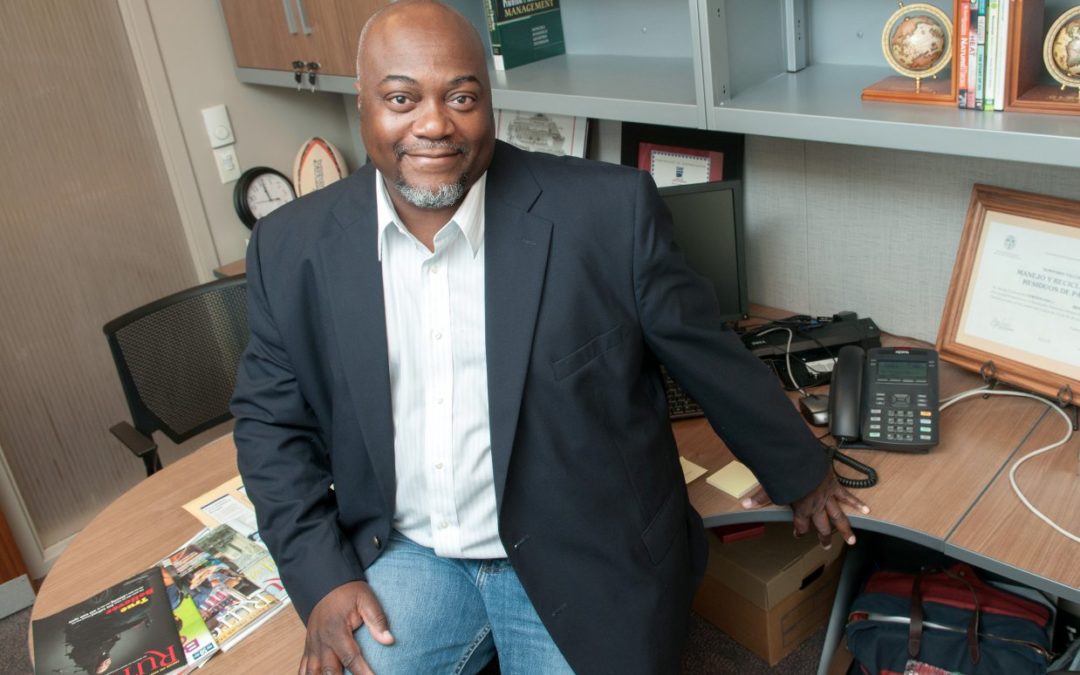Meet Our Faculty: In this new content series, Rutgers Global Health Institute highlights our core faculty members.
Kevin Lyons
When you think about the job titles “archaeologist” and “business professor,” chances are you’re envisioning two very different people. When it comes to global health, however, the intersection of these fields is an area where Kevin Lyons is making an impact. As a core faculty member of Rutgers Global Health Institute, Lyons contributes a multidisciplinary perspective related to climate, disaster response, and supply chains.
Other Rutgers Roles
- Associate Professor of Professional Practice, Department of Supply Chain Management, Rutgers Business School–Newark and New Brunswick
- Associate Director for Business Development, Rutgers EcoComplex
- Associate Director, Rutgers Energy Institute
Some Call Him “Mr. Trash”
As a pioneer in the field of supply chain archaeology, Lyons has visited every continent to conduct “digs” at landfills and waste sites in order to better understand what people throw away. This influences his understanding of a product’s entire life cycle, from creation to consumption—plus its impact on climate change.
“My students affectionately call me ‘Mr. Trash,’” he says in this video produced by Benefunder about his work “greening the supply chain.” Humans, he says, are producing “so much, but not accounting for the impact that’s having.” His goal is to implement a certification or label that would appear on products to educate consumers about its overall effect on the climate—not just through its consumption or use, but also its production, distribution, and discard.
Responding to Emergencies with Business Acumen
Lyons also conducts applied research on disaster-response supply chains, where the “bottom line” isn’t profit—it’s saving lives. The aim is to strengthen health care and pharmaceutical supply chains to improve emergency-response readiness in instances of weather- and climate-related disasters (hurricanes and earthquakes, for example) as well as crises related to terrorism, conflict zones, or industrial accidents.
“Cross-disciplinary input from health professionals and individuals on the front lines of global disasters helps shape the problems within disaster-relief supply chains, allowing us to prioritize the immediate needs,” he says. For example, following 2017’s Hurricane Maria, donated supplies sat on ships at the port of San Juan, Puerto Rico, for multiple weeks without being distributed.
Air Force Roots
While on active duty in the U.S. Air Force from 1980–1986, Lyons was a non-commissioned officer of supply chain management, procurement, and logistics. He was assigned to the procurement and comptroller divisions at F.E. Warren Air Force Base in Wyoming and later the joint Department of Aerospace Science at Rutgers and Princeton University. His career progressed into numerous leadership positions and industries, eventually landing him back at Rutgers, where he honed his expertise in supply chain management related to health and the environment.
Lyons says he was compelled to act when he “learned that global health professionals are relying on traditional methods of receiving the goods and services they need through old, outdated supply chain systems. I knew at that point that I could bring value and solutions to their decades of problems, so that they could concentrate on their health-impact work.”
Partners for Progress
Among Lyons’s current Rutgers partners are the Center for African Studies (creating a course about African foodways) and the Department of Marine and Coastal Sciences’ Offshore Wind Project for New Jersey (developing ways for wind to become a reliable substitute for fossil fuels).
He is constantly motivated by opportunities to collaborate across disciplines. “It’s the ability to always find a way for your life’s work to become meaningful and supportive to others outside your area of research.”

